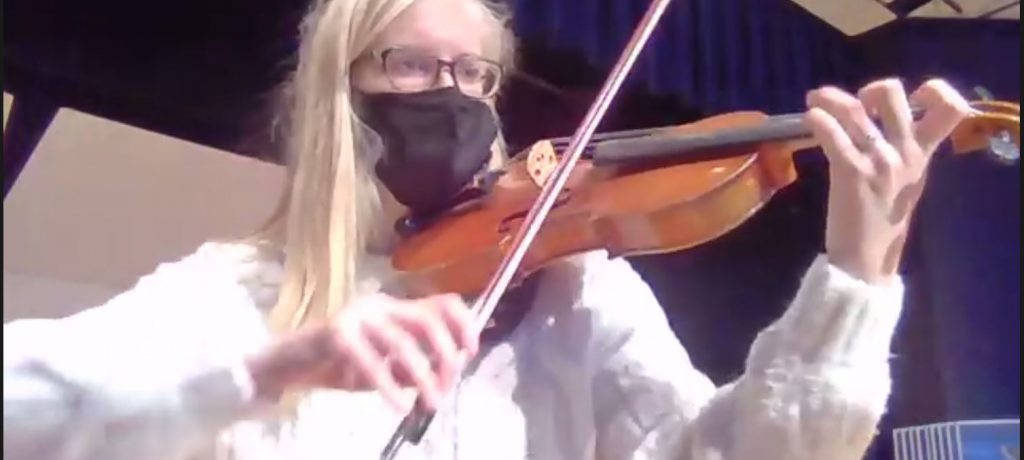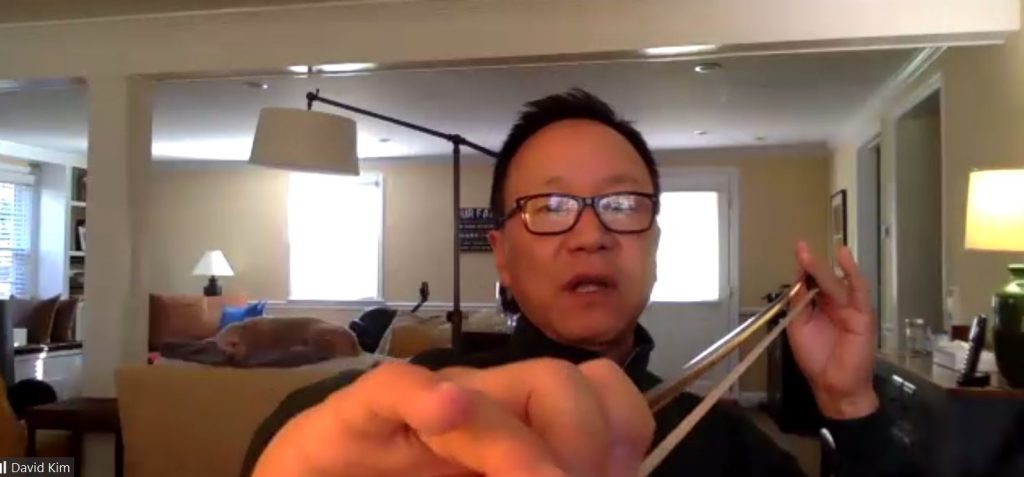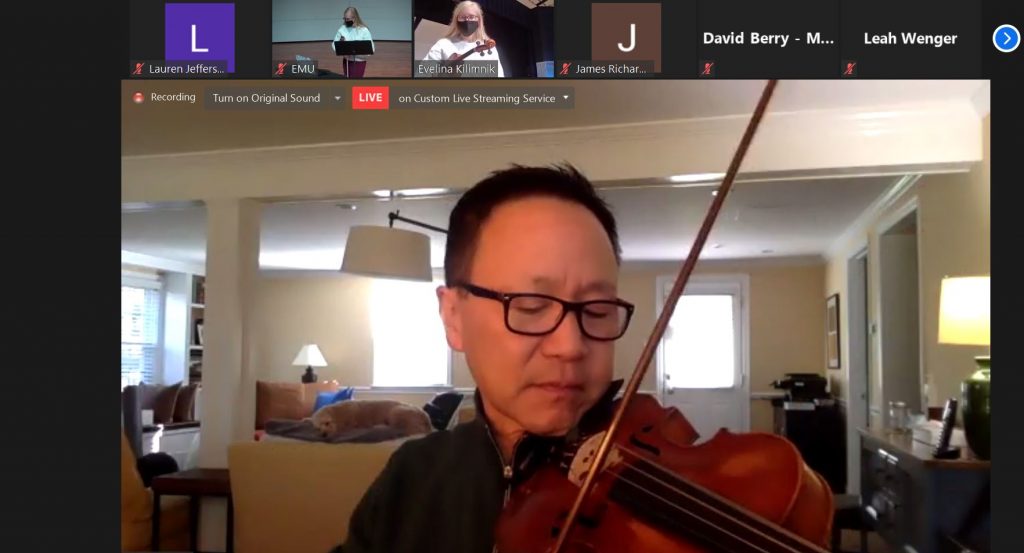Even with 14 years of experience and several masterclass sessions in her past, senior music performance major Eve Yavny was a little nervous as she put bow to strings and began to play the Adagio movement from Bach’s Sonata No. 1.
With good reason.
The virtual Masterclass in mid-November at Eastern Mennonite University was with David Kim, “one of the world’s great violinists” and concertmaster of the Philadelphia Orchestra, “known for decades upon decades as having the finest strings section among many world-class orchestras, said Professor James Richardson.

When she finished, Kim praised her courage. “Playing unaccompanied Bach in public is one of the scariest things a violinist can do,” he said, going on to urge more elongation of “the baritones and basses.” He also praised her sensitive use of vibrato, which, along with the bow hold, is an “individual fingerprint” of each violinist.
Later, Yavny called the experience “incredibly nerve-wracking to play in front of such an accomplished violinist,” but that Kim was “approachable and down-to-earth.” The biggest takeaway, she said, “was to focus on the lower notes in chords. They’re often brushed aside in favor of the higher melodies but they bring a core to the sound that really makes a difference in the big picture.”
Kim’s virtual visit also included an interview and a question and answer session, hosted by Richardson. The audience included music majors, music faculty, and other students involved in EMU’s music program, as well as Preparatory Music Program faculty and more general music fans through a Facebook Live livestream.

In addition to his role as concertmaster, Kim is a well-known solo performer, educator, and adjudicator. Highlights of his 2020-21 season include appearing as soloist with The Philadelphia Orchestra; teaching/performance residencies and master classes at the Manhattan School of Music, Bob Jones University, the Prague Summer Nights Festival, the Taipei (Taiwan) Academy and Festival, and continued appearances as concertmaster of the All-Star Orchestra on PBS stations across the United States and online at the Kahn Academy, as well as recitals, speaking engagements, and appearances with orchestras across the United States.
Richardson knew Kim from living in Philadelphia; besides their shared profession, they both worshipped at the same church.
Kim is just one of many professional musicians that EMU faculty have sought to connect their students with during this time when in-person performances and programming is restricted (see EMU’s virtual Gala to listen to and enjoy collaborations with The Steel Wheels and AppalAsia).
The Masterclass “plus” format was one proposed by Kim when Richardson reached out to him. “We really thought this worked well, and will be inviting more guest artists to share their wisdom and experience with our students and community in the spring semester,” Richardson said.
Kim fielded all sorts of questions with good humor, at one point urging “no softballs.”
“I was inspired by his honesty and vulnerability addressing everything from performance anxiety to the most inspiring moments of his career to the bizarrest, funniest events on stage,” Richardson said afterwards.
Performing for the public is not as difficult or scary as performing in front of your colleagues, Kim said, adding that he gets nervous more than a year before his scheduled solo performances with the Philadelphia Orchestra. To prepare, he does “practice runs in advance” with any audience he can fit into his schedule. If that means “20 different retirement homes” in the Philadelphia area, then so be it.
“I would go and tell them what I was doing, what I was practicing for, and then I would tell them to pray for me,” he said with a smile.
The payoff for all of this preparation was that by the time he arrives at the venue for the performance, in the situation he was describing, Seoul, Korea, where he had the added pressure of being the first Korean-American concertmaster of a major symphony, Kim said that he knew the piece “inside and out … I had made mistakes and recovered.”
Kim also spoke of how his faith has played a role in his profession and artistry [read more in this article].
“There are times when I might be in the wings of Carnegie Hall when I have a big solo coming up,” he said. “I will feel completely overwhelmed. It’s overwhelming the nerves that come in and at those moments, I throw my hands up and say ‘God. I know you didn’t put me into this position to fail.’ I swallow hard and walk on the stage.”
While the pandemic has limited travel and performances, Kim said he learned just how “overscheduled” he was.
“When you are a concertmaster of a big orchestra and when you have a personality like mine, I love to help with fundraising, cultivating patros and board members. My responsibilities are more than being on stage and leading the orchestra as a concertmaster,” he said. “I have a wonderful solo career where I travel around the world. And I have a third career, teaching … I have so much more free time and it’s been amazing. I love all that stuff but what I’m hoping when covid is done and we’re back to normal life, I don’t try to jump back in and catch up.”
Here’s a few more tips from his Q & A.
- Say yes to everything…now is the time is the go out and experiment and succeed and fail. … Every single thing I do is preparing for the next thing. Everything you say yes to helps you be prepared for the next thing that rolls around. Don’t feel like it’s a sprint.
- Surround yourself with people who know you well and will help you. (Kim says he is a procrastinator, so it helps that all of his family members know this and can tell him when he is doing it.)
- Get creative when you are unmotivated or discouraged. Call a friend and challenge them to a “scales contest” or create your own performance.
- Figure out what you need to practice well (for example, do you need a neat and tidy place? Is morning better? Before or after a meal?) Experiment and try different things and you will eventually come up with a routine that works for you.
- Practice getting nervous. Find and create opportunities to test yourself.
- Every day is a new opportunity to look for that beautiful sound. It might take ten seconds or ten minutes. (For musicians of stringed instruments especially, Kim says: Feel the resonance of the violin. It will give it to you thru the instrument you can feel it through your chin…you can feel that maximum vibration. There’s a tactile element because you can feel it and visual element because you can see the string move, and an aural element, because you can feel that incredible sound.)
